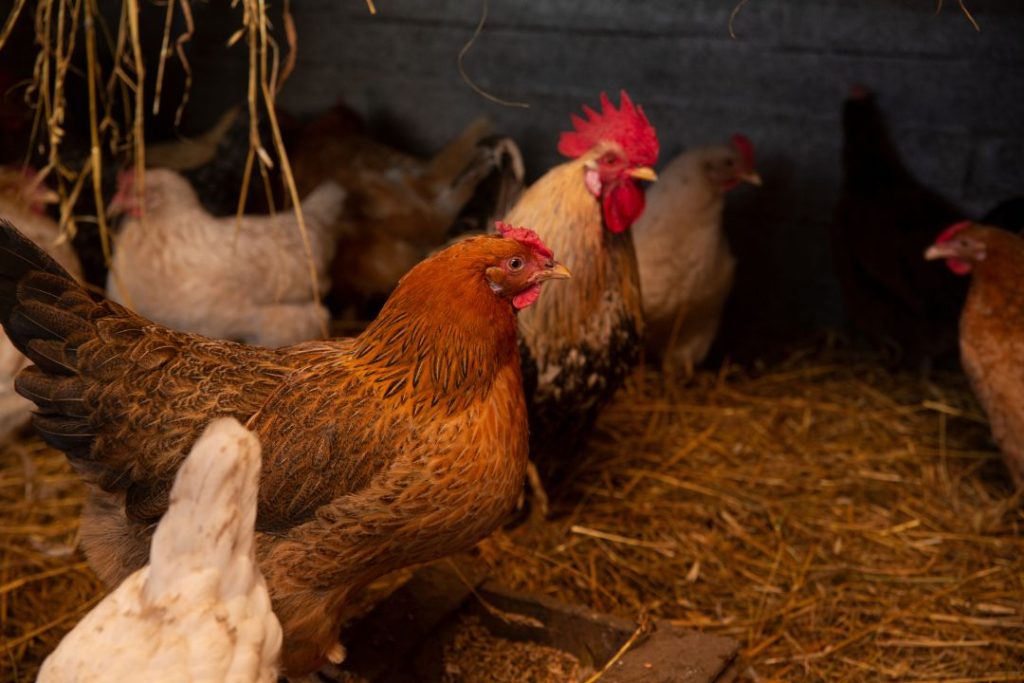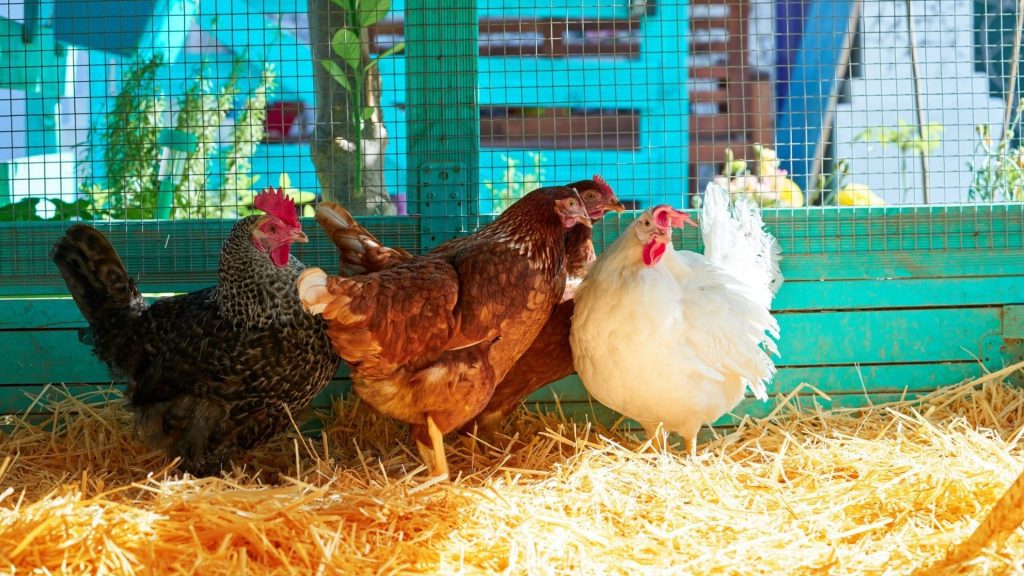How to disinfect a chicken coop is a question that chicken coop owners frequently ask. You must maintain a clean and sanitary chicken coop for your chickens’ health and welfare.
To disinfect your chicken coop, the necessary equipment are gloves and protective gear, a broom and a dustpan. And the others are scrub brushes, a spray bottle, a disinfection solution, and trash bags.
However, to disinfect your chicken coop, empty it, remove its bedding and debris, and pressure wash your coop’s interior. After that, scrub surfaces, disinfect nesting boxes, inspect and treat the cage and let it air out.
Cleaning your chicken coop may prevent the spread of disease, protect your birds’ well-being, maintain good egg production, and reduce dependency on antibiotics.
We’ll go over the exact procedures for cleaning your chicken coop. Let’s move on to the main discussion point below:
Why Disinfecting Your Chicken Coop Is Important?
Beyond just being aesthetically beautiful, maintaining the general health and well-being of your chickens depends on keeping their coop clean and hygienic:
1. Preventing Disease Spread
Keep your chicken coop clean and sterile to prevent infections from spreading among your flock. Chickens are prone to many diseases and viruses. So quickly, they can get sick.
Additionally, harmful infections can thrive in an unclean environment like a dirty coop. Regular disinfection aids in the elimination of bacteria, viruses, and parasites. It lowers the danger of diseases that might kill your chickens.
2. Protecting Your Flock’s Health
You may give your chickens a sanitary environment by periodically cleaning their coop. If you keep your hens’ cages clean, they will be less likely to have infections that can be treated. It will stop them from laying as many eggs, limit their growth, and in the worst cases, even kill them.
3. Ensuring Safe Egg Production
A sanitized coop is directly linked to the safety of the eggs your chickens produce. The eggs may be contaminated with bacteria and other dangerous pathogens, endangering customers’ health. Ensure that the eggs collected are safe for eating by keeping the coop clean.
4. Maintaining Poultry Performance
A healthy and disease-free environment positively impacts your flock’s performance. Chickens raised in a clean and sanitized coop are less stressed, allowing them to focus their energy on growth and egg production.
This can improve egg quality and quantity, making your poultry operation more efficient and successful.
5. Controlling Parasite Infestations
Parasites like mites and lice can quickly infest a dirty chicken coop. These pests can cause discomfort and health issues for your birds, leading to reduced productivity and well-being.
Regular disinfection helps eliminate existing infestations and is a preventative measure against future outbreaks.
6. Reducing Antibiotic Dependency
Maintaining a clean and hygienic coop minimizes the need for frequent antibiotic treatments. Overuse of antibiotics in your chicken can lead to antibiotic resistance in bacteria, making it more challenging to treat infections effectively.
A proactive approach to disinfection can reduce the reliance on antibiotics and promote healthier, more sustainable poultry farming practices.
7. Meeting Biosecurity Standards
Biosecurity is essential in commercial chicken raising to stop the introduction and spread of illnesses. Regularly cleaning your chicken coop aligns with biosecurity procedures.
It lowers the danger of infection and safeguarding your poultry enterprise from outbreaks that can have serious financial repercussions.
What Tools and Equipment Do You Require to Disinfect Your Coop?
To get started, gather the following tools and equipment for a thorough cleaning session:
1. Gloves and Protective Gear
Wear gloves and appropriate protective gear to protect yourself from pathogens or irritants.
2. Broom and Dustpan
A broom and dustpan are essential for removing loose debris, droppings, and feathers from the coop.
3. Scrub Brushes
Invest in scrub brushes of different sizes to tackle various surfaces and hard-to-reach areas.
4. Disinfectant Solution
Choose a poultry-safe disinfectant that eliminates bacteria and viruses without harming your chickens.
5. Spray Bottle
A spray bottle filled with disinfectant allows for easy application on surfaces.
6. Trash Bags
Keep plenty of trash bags on hand to dispose of the soiled bedding and other waste.
How To Disinfect A Chicken Coop?
Follow these simple yet effective techniques to ensure the well-being of your feathered friends:
1. Empty the Coop
Take every chicken out of the coop and place them in a clean, secure location. Ensure your chickens have access to food and water throughout this time to keep them comfortable.
2. Remove Bedding and Debris
Dispose of the old bedding, droppings, feathers, and other accumulated debris in the coop. Use a broom and dustpan to thoroughly sweep the floor and nest boxes, leaving no traces of dirt behind.
3. Pressure Wash the Interior
Equip yourself with a pressure washer and spray down the coop’s interior, including walls, floor, and nesting boxes. The forceful spray removes dirt and grime, leaving your cell fresh and clean. Allow the cage to dry completely before moving on to the next step.
4. Scrub Surfaces
Grab your scrub brushes and the poultry-safe disinfectant solution. Scrub all surfaces inside the coop, paying particular attention to corners, perches, and roosting areas.
This thorough scrubbing process eliminates any bacteria or parasites that survived the pressure washing.
5. Disinfect Nesting Boxes
To maintain a clean atmosphere for egg-laying, thoroughly clean and sanitize the nesting boxes. Change the nesting material for a brand-new, clean straw so your chickens have a cosy area to deposit their eggs.
6. Inspect and Treat
As you clean, carefully inspect the coop for any signs of damage or areas needing repairs. Promptly address issues to maintain a secure and safe cage for your chickens.
7. Let It Air Out
After disinfection, allow the coop to air out for a few hours. This step ensures that residual disinfectant fumes dissipate before reintroducing your chickens to their freshly cleaned home.
Regular cleaning and disinfection will help protect your flock from diseases and ensure the eggs they produce are safe for consumption. Happy chicken-keeping.
How To Maintain A Clean Coop?
Regular cleaning of your chicken coop is required. Here are some guidelines for maintaining a clean environment for your hens.
1. Regular Cleaning Schedule
Establish a consistent cleaning schedule to prevent the buildup of dirt and debris in the coop. Cleaning once a week is a good starting point, but adjust the frequency based on your flock’s size and coop conditions. Regular cleaning not only keeps the coop looking tidy but also ensures the well-being of your birds.
2. Use Diatomaceous Earth
Consider using food-grade diatomaceous earth in the coop to promote a pest-free environment. This natural powder is safe for chickens but controls common pests like mites and lice. Applying a diatomaceous world in the coop’s crevices and corners can help prevent infestations.
3. Quarantine New Birds
Before integrating new hens into your existing flock, isolating them in a different area for a few weeks is essential.
While separating the newcomers to prevent the disease from spreading to the rest of the flock, you can monitor their health. Regularly observe the quarantined birds for any signs of illness before integrating them with the others.
4. Limit Visitors
Minimize the number of visitors to your coop to reduce the risk of introducing external pathogens. Visitors, including other animals or pests, can unknowingly bring harmful bacteria or diseases.
Implementing biosecurity measures, such as foot baths and hand sanitizing, for anyone entering the coop area can further protect your chickens.
You must ensure a clean and healthy living environment for your chickens. It will promote their overall well-being and productivity. Remember, regular maintenance is vital to maintaining a happy and thriving flock!
Frequently Asked Questions
How Often Should I Disinfect My Chicken Coop?
At the very least once every month, disinfect your chicken coop. If there are any symptoms of illness or an infestation, you can disinfect your cage more frequently.
Can I Use Household Cleaners to Disinfect the Coop?
Avoid using household cleaners because they may contain harmful chemicals that could harm your chickens. Opt for poultry-safe disinfectants instead.
Is It Necessary to Disinfect the Coop in Winter?
Yes, disinfecting in winter is equally important as in other seasons, as bacteria and parasites can still thrive in colder temperatures.
End Note
Your chicken flock’s health and well-being depend on you. Therefore keeping your chicken coop clean and disinfected is essential. By implementing regular maintenance and adhering to step-by-step cleaning practices, you’ll guarantee that your hens have a safe and sanitary environment to grow.
Remember to use poultry-safe disinfectants and use protective equipment during the cleaning process. Happy cleaning, and may your chicken coop remain a haven for healthy and happy birds!



